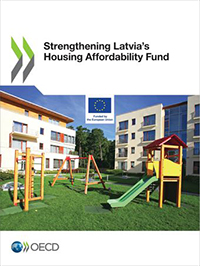Économie de la Léttonie en un coup d’œil
Étude économique de la Lettonie (avril 2024)
La guerre d'agression de la Russie contre l'Ukraine a entraîné une hausse des prix de l'énergie et des perturbations dans le commerce et les chaînes d'approvisionnement, ce qui a pesé sur la croissance économique. La convergence économique s'était déjà ralentie avant la pandémie, nécessitant une accélération des réformes structurelles. Les pressions croissantes sur les dépenses liées à la défense, à la sécurité intérieure, à la santé et à la pauvreté des personnes âgées doivent être traitées en augmentant l'efficacité des dépenses et les recettes fiscales, tandis que la charge fiscale devrait être transférée du travail vers l'emploi. La charge fiscale devrait être déplacée du travail vers d'autres impôts sur le revenu, la propriété et l'environnement. Il est essentiel de continuer à améliorer la capacité du secteur public, d'encourager l'investissement et l'innovation et de remédier aux pénuries de main-d'œuvre qualifiée pour augmenter le potentiel de croissance. Il est essentiel de continuer à améliorer les capacités du secteur public, d'encourager l'investissement et l'innovation et de remédier aux pénuries de main-d'œuvre qualifiée pour augmenter la croissance potentielle.
Executive Summary
Presentation
Video

Perspectives Économiques - Lettonie
.png)
Strengthening Latvia’s Housing Affordability Fund (June 2023)
In response to persistent housing quality and affordability challenges, the Latvian government recently established the Housing Affordability Fund, a long-term self-sustaining financing model to channel investment into affordable housing. This report summarises the main findings from a project to support Latvia in identifying the institutional arrangements, funding and financing opportunities, and operational tools to scale up the Fund and ensure its lasting impact on the housing market. The report draws on the rich and diverse experiences of four peer countries in establishing and operating revolving fund schemes for affordable housing (Austria, Denmark, the Netherlands and Slovenia), as well as engagement with a range of stakeholders in the Latvian housing market. This project was carried out by the OECD, in the framework of the Technical Support Instrument of the European Union, in collaboration with the Directorate General for Structural Reform Support of the European Commission and the Latvian Ministry of Economics.
This work is a joint effort of the OECD Economics Department and the Directorate for Employment, Labour and Social Affairs.
Policy actions for affordable housing in Latvia (June 2020)
Housing affordability and quality are pressing challenges in Latvia. While Latvian households spend, on average, less on housing than their OECD peers, many are stuck in poor quality housing. Residential investment has stagnated since 2008, and the housing stock has been insufficiently maintained. In the face of these challenges, public support for housing is limited and an underdeveloped rental market further limits affordable housing alternatives. This report provides an in-depth assessment of housing affordability challenges and identifies policy actions to address them. The report is the result of the work of an interdisciplinary team bringing together the Economics Department and the Directorate for Employment, Labour and Social Affairs. The report contributes to the cross-cutting OECD Horizontal Project on Housing.
- Remarks by Angel Gurría, OECD Secretary-General
- Media coverage, LTV
